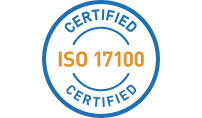
When selecting a qualified Language Service Provider (LSP), you must make informed choices and carefully consider your options. Whether you’re new to the process or looking for a new partner to enhance your global reach, our guide is intended to provide valuable insights. We aim to help you make the most of your time, resources, and accomplishments in language translation and localization.
Making the right choice in an LSP can significantly impact your global business success. Here are the top 12 traits to look for in a qualified Language Service Provider:
1. Prioritizing Value Over Price
Resist the urge to view translation services as mere commodities. Instead, recognize the long-term value as a superior Return On Investment (ROI) measure. Choosing a subpar, budget-oriented LSP could lead to unforeseen complications, including hidden expenses, retranslation needs, and compromised international revenue. Opt for excellence in translation services.
2. Industry expertise alignment
Place your trust in accomplished professionals with a proven track record. Demand a combination of industry experience, advanced academic qualifications, and accreditation from recognized translation associations. Ask for detailed credentials to ensure the credibility of your chosen LSP.
3. Size Isn’t Everything: Finding the Right Fit
Neither bigger nor smaller LSPs have an exclusive advantage. Recognize the distinct operational styles of differently sized LSPs. While larger entities boast abundant resources, they may prioritize significant clients. Smaller firms offer personalized attention but might face scalability limitations. Seek alignment with your service needs and scale for the best customer service experience.
4. Coherence in Approach: Consolidating LSPs
Dividing projects across multiple LSPs introduces branding, compliance, and consistency complexities. Opt for a single, capable translation partner to ensure unified and efficient outcomes. Simplify processes and maintain coherent Translation Memories (TMs).
5. Collaborative Engagement: Your Role in Outsourcing
Collaboration is crucial for successful outcomes. Partner with an LSP that guides you through onboarding, encouraging joint efforts for effective results. Foster a working relationship beyond transactions and seek flexible solutions.
6. Quality Assurance and Beyond: ISO Certification Consideration
ISO certification reflects an LSP’s commitment to quality management. Inquire about ISO 9001 QMS adoption to ensure standard controls for documentation, auditing, and resource management. Address quality concerns through ISO certification discussions.
7. Managing Projects: The Role of Project Managers
Project managers play a pivotal role in project success. Gain insights into their background, experience, and qualifications. Establish a seamless working relationship with project managers as integral extensions of your in-house team.
8. Empowering Localization through Technology
Evaluate your potential partner’s approach to translation management systems (TMS). TMS streamlines localization, providing analytics and reporting tools. Seek flexibility, compatibility, and integration capabilities to ensure readiness for the future. Large language Models (LLM) of data and workflows should be a focus point of solutions by your partner.
9. Seamless Connectivity: Access to Information
Expect round-the-clock access to project data, quotes, billing, and more. Verify the availability of a secure, web-based project lifecycle solution for transparent and convenient access.
10. Multimedia Capabilities: Crafting Engaging Content
If multimedia content creation is on the horizon, assess your LSP’s multimedia support. Determine if they possess in-house studio resources or collaborate with sub-vendors for multimedia content.
11. Global Safety Net: Expertise in International Expansion
Choose an LSP that doubles as your in-country guide, offering insights into various markets’ legal, marketing, and political nuances. Navigate international waters with a knowledgeable partner to avoid pitfalls and maximize success.
12. Inquisitive Approach: Key Questions for Qualified LSP Selection
Rely on this guide’s insights to pose pertinent questions to prospective LSPs. Inquire about their experience, client base, personnel, ISO certification, technology, rates, and additional services. Investigate their online presence for further validation. Do they offer a variety of translation models? (Machine translation only, hybrid model with machine and humans working together, or complete human translations).
Conclusion
In summary, selecting a suitable LSP requires thoroughly analyzing your requirements and needs. This guide provides the necessary knowledge to make an informed and strategic decision. With numerous LSPs available worldwide, finding a partner that aligns with your goals is essential. At MediaLocate, we are ready to answer your questions and support you on your journey to achieving international success.











